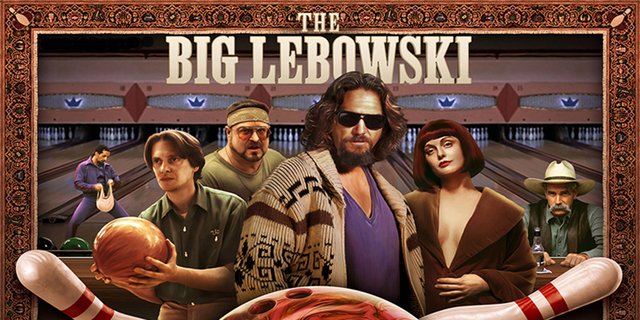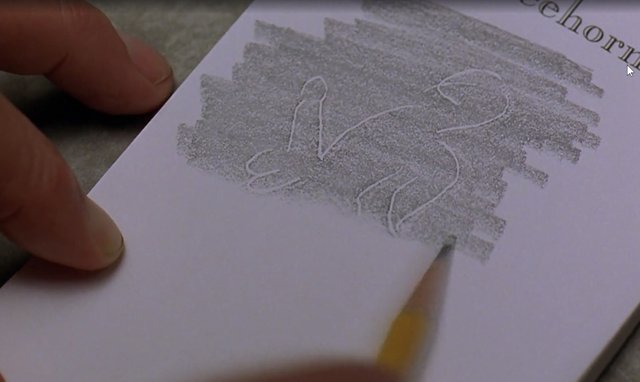[Movie] @mgaft1, the review for movie The Big Lebowski (1998)

I heard that this movie divides people into those who love it, and those who simply cannot stand it. Not belonging to either category, I find that this film contains many good funny scenes, but, in general, it does not hold my attention well, and, at times, I wanted to walk away from it.
For those who did not see it — in the center of the narrative is a man by the name Jeff Lebowski, who refers to himself as the Dude. He is unemployed, drives an old broken jalopy, smokes marijuana, does not strive for anything, and does, basically, nothing. His only document is his bowling alley membership card. In the 60's he participated in a little known musical group, held some positions of low authority and since then was unemployed. In the movie, he is forty or forty-five years old.
The Dude gets mixed up into a ridiculous story with the alleged kidnapping of another Jeff Lebowski’s wife, (this one is the millionaire) and requested ransom for her release. As the action in the movie progresses, he is on a receiving end of all the troubles from all possible sides of this conundrum. The story ends when the allegedly kidnapped wife returns from Vegas, in a skirmish with alleged kidnappers, during which one of Dude's buddies (Dunny) dies from heart attack.
At a first glance, it seems that the film is about nothing, that it does not have a theme, it is connected by a very loose plot and moves forward with jerks, from one ridiculous scene to another one. These scenes, however, are full of a subtle intelligent humor, especially, for example, in an episode with a fanciful and extravagant avant-garde artist and feminist Mod Lebowski.
Humor is based on the interaction of people existing on different intellectual and cultural levels. Mod expresses herself in a fancy and sophisticated way, dispassionately alternating scientific terms with a street jargon. Her stream of consciousness dwells in the world of artistic perceptions and events while as The Dude speaks simply and unassumingly, as basic as possible.
Another source of comedic situations — Walter Sobchak — a friend of Jeff, a veteran of the Vietnam War. He is mentally unbalanced, overly emotional, has absurd life principles, and trying to help, often aggravates the depressing state of affairs.
The movie has much of a purely situational humor; not the silly physical kind, but the one based on mockery of the stereotype perception.
The most notable moment happens when Jackie Treehorn — a director of the porn industry, jots down something apparently important in his notebook and leaves the room. Thinking that this information could be crucial in the kidnapping case, the Dude runs up to the notebook and uses the forensic method to reveal its hidden meaning.

The significance of the movie, in my opinion, lies in its structure, which contradicts the doctrine of the standard American script writing. A typical American scenario is built according to the following pattern: a protagonist is a person who has a strong aspiration or desire. On the way to satisfying this desire (achieving this goal), there are serious obstacles. The protagonist’s character is manifested in a way of how he or she overcomes these obstacles and the viewer is kept in suspense by showing the interaction of the protagonist and the antagonist (a man, nature, an alien or a robot).
A typical Hollywood movie that is build based on such a pattern is, for example, "The Matrix." The protagonist of the film tries to free people from the power of the Matrix and enters into a battle with antagonistic programs — "agents" of the Matrix. In the movie “The Terminator”, the protagonist tries to escape from the evil robotic killer. In the movie “The Transporter,” the protagonist tries to save the life of the girl, thus getting into a conflict with the members of the mafia, who intended to kill her. The focus of this type of a movie is on how it ends.
In the movie “The Big Lebowski,” the main character is not a hero or an anti-hero. He is the direct opposite of a heroic character. His main motivation — to get back his rug. Otherwise, his actions —more reactions to what others are doing to him. I think the Coen brothers wanted to get away from the template and experiment with the alternative plot construction — the one where the movie is watched not for the sake of what happens in the end, but in spite of what happens there.
Coen's brothers’ approach in writing this script utilizing Raymond Chandler’s approach in the detective genre.
The emotional basis of the standard detective story was and had always been that murder will out and justice will be done. Its technical basis was the relative insignificance of everything except the final denouement. What led up to that was more or less passage work. The denouement would justify everything. The technical basis of the Black Mask type of story on the other hand was that the scene outranked the plot, in the sense that a good plot was one, which made good scenes. The ideal mystery was one you would read if the end was missing.
After watching the movie, there is the impression of getting to know some funny and silly, but real people, one of the many living in that special time — 1990s in Los Angeles. Thus, the theme of the film pops up in the mind gradually. A stranger in a cowboy hat, which on the one hand is a regular of the bowling alley, but on the other hand is a voice passing through the fourth wall and addressing directly to the viewer, vaguely outlines it. He characterizes Dude as a person who lives without ambitions but also without doing any harm to anyone — “he lives for all of us sinners.” “Of course,” he reflects “it's sad that Danny passed away but on the other hand a new man, little Lebowski, in on the way…”, and so the cyclical development of life on earth proceeds.
In the last scene, the stranger in a hat regrets Danny’s death, while the Dude answers him with the rephrased adage “Sometimes you eat the bar and sometimes the bar eats you.” Here we can witness a clever double entendre, which Coen Brothers master so well. The original old saying sounds like this “Sometimes you eat the bear and sometimes the bear eats you.” However, “bear” being pronounced as “bar” due to the Strangers’ southeastern drawl. In another sense, “bar” is an allusion to the Jungian model of the human psyche where the bar represents the divide between the conscious mind and the unconscious. Thus, the Stranger is also saying that sometimes the conscious mind is in control of the psyche, and sometimes the unconscious mind is in control. Characters in the movie such as The Dude, Walter, Jackie Treehorn, Jeff Lebowski live in the past, which governs their behavior via subconscious mind.
Respectfully, @mgaft1.

We’ve opened up the chat for our community: https://t.me/owl_chat, https://discord.gg/bpKNHhP
We also have own channel with reviews from Steemit on Telegram: https://t.me/owl_recenzent.
You are welcomed to participate and subscribe!
Sign up for our Owls! At Golos, Steemit, Litsovet and everywhere!

happy to have friends like you, perfect blog about the latest movie.
Thank you, friend. Even though this is a 20 year old movie, it still seem very much in tune with who we are today.
Thanks @mgaft1 ,I have shared this post.
Happy to have friends
Like you, perfect blog about
The latest movie.
- mattmcguire
I'm a bot. I detect haiku.